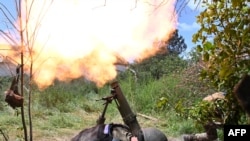Latest developments:
- Ukrainian President Volodymyr Zelenskyy said there was fierce fighting along the front lines but that his forces were advancing in southern Ukraine and holding defensive lines in the eastern part of the country.
- International Atomic Energy Agency chief Rafael Grossi said the safety and security situation at the Zaporizhzhia nuclear power plant is "extremely fragile" following the destruction of the nearby Kakhovka dam and he called on all sides in the conflict to act to adhere to principles to prevent a nuclear accident.
The European Union on Wednesday imposed new sanctions against Russia for its war against Ukraine, targeting countries where businesses have used loopholes in previous sanctions to continue to trade with Russia, effectively supporting President Vladimir Putin’s 16-month invasion.
The 27-nation EU had previously imposed 10 rounds of sanctions against Russian companies, while freezing assets and imposing travel bans on more than 1,000 officials.
The new sanctions are aimed at keeping key war-related materials and goods from reaching Russia via nations that trade with the EU but have also maintained a business-as-usual relationship with Moscow.
European Commission President Ursula von der Leyen, head of the EU's executive arm, said the new sanctions will "deal a further blow to Putin's war machine with tightened export restrictions, targeting entities supporting the Kremlin."
"Our anti-circumvention tool will prevent Russia from getting its hands on sanctioned goods," she said.
Aside from sanctions against Iranians alleged to be supplying drones to Russia, it is the first time that the EU has targeted trade via other countries.
The new package will also target 71 individuals and 33 entities in relation with the illegal deportation of Ukrainian children to Russia.
Also included is a prohibition to accessing ports in the EU by vessels engaged in ship-to-ship transfers when there is a suspicion that a boat is not respecting the ban on importing seaborne Russian crude oil and petroleum products into the bloc. In addition, the package extends the suspension of the broadcasting licenses in the EU of five Russian media outlets under state control.
NATO expansion
U.S. Secretary of State Antony Blinken on Wednesday encouraged Turkey to support ratifying Sweden’s accession to NATO.
State Department spokesperson Matthew Miller said Blinken expressed support for Sweden to be admitted at this time during talks with Turkish Foreign Minister Hakan Fidan on the sidelines of a Ukraine recovery conference in London.
Sweden and Finland applied for membership in response to Russia’s invasion of Ukraine. Finland officially joined in April, but Sweden’s accession has been held up by Turkey’s objections to what it said was a lack of action by Sweden against groups that Turkey considers terrorists.
With three weeks until NATO leaders gather for a summit in Vilnius, Lithuania, Sweden expressed hope that it will be able to join the alliance.
Swedish Foreign Minister Tobias Billstrom told Reuters that Turkey’s parliament should begin the process of ratifying Sweden’s NATO bid.
Sweden has carried out a number of reforms, including a new anti-terror law, as part of an agreement struck with Turkey last year to address security concerns.
"Our judgment is that we have done what was expected of us. Now it is time for the Turkish parliament to start the ratification process," Billstrom told Reuters on the sidelines of a meeting in parliament.
Some information for this story came from The Associated Press, Agence France-Presse and Reuters.





